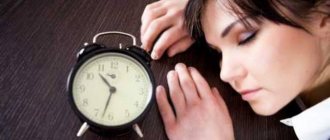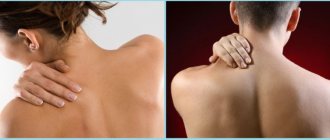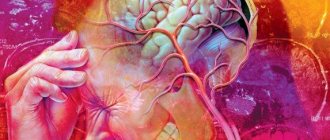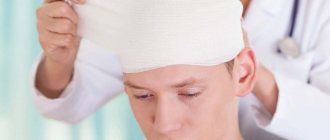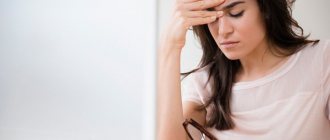Constant headaches are a common reason for patients to turn to neurologists at the Yusupov Hospital. People experience headaches in the evening, in the morning after sleep, which do not go away after taking painkillers, and at night. Frequent headaches in men can occur in the presence of pathology of cerebral vessels or brain tumors.
Persistent headache is an indication for a comprehensive examination of the patient. Neurologists conduct instrumental analyzes using the latest equipment from leading global manufacturers. Analyzes are performed by experienced laboratory technicians. Patients are advised by candidates and doctors of medical sciences. Leading specialists in the field of headache treatment collectively develop tactics for managing patients whose headache does not go away for several days.
Non-pathological causes of daily headaches
Brain activity is disrupted due to minor disturbances in blood supply, metabolism, and innervation. Night headaches occur for the following reasons:
- lack of oxygen;
- high temperature in the bedroom;
- drinking alcohol in the evening;
- overwork.
Healthy sleep depends on bedding and posture. On a high pillow, the cervical spine bends strongly. Even in the absence of discomfort during sleep, muscle tension occurs and cerebral blood flow is disrupted. Sleeping without a pillow can also cause pain in the head and neck. Low-quality fabric dyes and softeners used to wash bed linen often contain harmful ingredients that cause breathing problems and headaches in the morning.
Experiences and intense mental activity in the evening lead to brain overstrain. At night he cannot switch off. The patient cannot sleep and often wakes up. After waking up, you feel discomfort, pain in the head, and fatigue. He gets morning headaches.
Treatment of headaches in the morning
When treating headaches in the morning, it is important to determine their cause and follow a few simple rules:
- If pathologies are diagnosed, undergo a course of therapy.
- To combat dehydration (dehydration), it is recommended to consume as much clean (filtered) water as possible. This will help the body excrete significant amounts of endotoxins through the kidneys.
- Try to be outdoors as often as possible.
- Avoid physical and mental stress.
- Spend less time in front of the TV and computer monitor.
- Avoid nicotine and alcohol-containing drinks.
- Follow the work and rest schedule.
- Don't overeat at night.
Try to sleep in the most comfortable position possible. Use small pillows.
Therapist, Sovinskaya Elena Nikolaevna
The text was checked by expert doctors: Head of the socio-psychological service of the Alkoklinik MC, psychologist Yu.P. Baranova, L.A. Serova, a psychiatrist-narcologist.
CAN'T FIND THE ANSWER?
Consult a specialist
Or call: +7 (495) 798-30-80
Call! We work around the clock!
Pathological causes of headaches
A common cause of nighttime headaches is oxygen deficiency. It may be caused by abnormalities of the nasal passages and respiratory tract diseases. Night headaches occur after sleep apnea.
Blood supply to the brain is impaired during hypotension. The outflow of venous blood worsens due to a decrease in the tone of the intracranial veins. In the morning the patient feels it in his head.
With arterial hypertension, blood pressure may increase during sleep. The reason is the patient’s age, disruption of sleep and rest patterns. Vascular tone is impaired in diseases of the thyroid gland and heart. Nocturnal hypertension is dangerous for the development of heart failure and stroke. Headache occurs at night or in the morning.
Stress, anxiety, and mental trauma affect the central nervous system and change vascular tone. This provokes an increase in blood pressure and irritation of pain receptors in the walls of blood vessels. Night headaches that occur under the influence of psychogenic factors are varied in nature. They are accompanied by irritability, rapid heartbeat and are not relieved by analgesics.
Diseases of the cervical spine and temporomandibular joint can provoke night headaches. With back pain, a person is forced to take an uncomfortable position, which causes spasms of the neck muscles. They cause headaches.
Failure to comply with the dosage of glucose-lowering medications or refusal to eat dinner in diabetes mellitus results in a sharp decrease in blood glucose levels and severe headaches. Histamine disease is characterized by prolonged attacks of acute headache in the orbital area in the evening and at night.
In the presence of brain tumors, patients complain of night and morning headaches. As the disease progresses, it intensifies. The head hurts when changing position, the patient's hands go numb.
Throbbing morning headaches are felt during migraines. They often intensify when the light is turned on and are accompanied by nausea and vomiting. Constant headaches that bother the patient night and day are characteristic of brain infections.
Preventing morning headaches
- Rejection of bad habits;
- Compliance with the rules of a healthy diet (limiting fatty, fried, salty, spicy, sweet, fast food). Dinner 3-4 hours before bedtime;
- Maintaining a daily routine and proper sleep;
- Sports (fitness, dancing, yoga, morning jogging);
- Limiting TV viewing before bedtime;
- Relaxation, physical and psychological relaxation (meditation, massage, etc.);
- Spending enough time outdoors;
- Every 45 minutes when working at a computer, you need to rest for 15 minutes;
- Protect your head and eyes from the bright sun.
If, even after eliminating all external factors that can provoke a headache, it does not disappear, and, moreover, you observe other symptoms - nausea, vomiting, darkness in the eyes, heart pain, dizziness - you should immediately consult a doctor for examination, diagnosis and subsequent treatment.
Cluster headaches
Attacks of cluster (bundle) headaches occur in paroxysms and are difficult for patients to tolerate. The pain has the following characteristics:
- localized in the eye area;
- radiates to the forehead, temple, cheek;
- accompanied by lacrimation, sweating of the forehead, a rush of blood to the face;
- more acutely felt when the patient is lying down;
- starts and goes away suddenly.
Night headaches begin without cause between 9:00 p.m. and 9:00 a.m. The peak of pain occurs at night, from zero to three o'clock. Attacks occur cyclically, followed by painless periods. Attacks are observed mainly in men. Pain occurs after drinking alcohol.
Men whose relatives suffer from cluster pain are at risk. The risk of developing a painful attack increases with head injuries, migraines, sleep disorders, mental and physical stress. Neurologists include possible causes of cluster headaches:
- abnormalities of the hypothalamus;
- pathology of blood vessels;
- disruption of circadian rhythms.
Patients relieve an acute attack at home with lidocaine drops in the nose. For symptomatic therapy, neurologists prescribe special medications and oxygen inhalations. In difficult cases, electrical stimulation of the brain is performed and the nerves that cause pain are removed. During the cluster period, doctors recommend giving up alcohol and nicotine.
Sleep problems
Apnea
With this disease, breathing becomes very shallow during sleep or even stops for a short time.
Symptoms of sleep apnea include snoring and frequent headaches in the morning. You may have this problem if you:
- often wake up at night;
- feel sleepy during the day;
- sweat a lot during sleep;
- snore.
Sleep apnea may indicate more serious medical conditions, including heart problems and high blood pressure. If you notice these signs, consult your doctor.
Lack of sleep
Experts advise adults to sleep 7–8 hours a day. According to the American Headache Association's Sleep Disorders and Headache, pain increases when you sleep less than 6 or more than 8.5 hours.
Here are some tips to help improve your sleep quality.
- Go to bed and get up at the same time.
- Avoid caffeine, nicotine and alcohol. They disturb sleep.
- Before going to bed, try not to stimulate your brain: do not watch TV or surf the Internet.
- Do something calming, like meditation.
- Keep a list of what helps you sleep well and what hinders you.
- Create comfortable sleeping conditions. The room should be dark and quiet.
- Take a bath to relax before bed.
- Exercise regularly.
Diagnosis of headache
Neurologists at the Yusupov Hospital determine the cause and type of persistent headache based on data from a clinical examination of the patient, instrumental and laboratory research methods. Doctors at the Neurology Clinic prescribe the following diagnostic procedures:
- Doppler ultrasound of head and neck vessels;
- electromyography;
- electrocardiography;
- diagnostic spinal puncture (if a neuroinfection is suspected).
Computed tomography and magnetic resonance imaging are performed if a brain mass is suspected. To determine the condition of the cerebral vessels, contrast angiography or multislice tomography is performed.
Pain after sleep (in the morning)
The causes of pain after sleep are countless. First of all, you need to see a doctor to rule out a rather rare, but still occurring disease - ankylosing spondylitis (Bechterew's disease).
This disease is characterized by nightly pain in the lower back, however, only a specialist can confirm or remove this diagnosis. With ankylosing spondylitis, such a rather specific picture is observed - for three months there are very painful sensations in the lower back, the mobility of the spine is somewhat limited in the morning, a state of rest only increases them. My lower back is very tight and painful after sleep.
Another, but already common, cause of nighttime lower back pain is osteoporosis. Sometimes with this disease, lower back pain at night becomes simply unbearable. Morning pain in the lower back also occurs quite often. Then it is advisable to take some kind of painkiller, and in the morning, still gather your courage, go to the doctor.
Suffice it to say that herniated intervertebral discs, osteochondrosis, muscle spasms, and the so-called spinal instability characteristic of postmenopausal women - all this can lead to such an unpleasant phenomenon as night and morning lower back pain.
Only an osteopath can give you the correct diagnosis, especially since the modern level of diagnostics allows this to be done with ease. And modern medicine has enough methods in its arsenal to eliminate all problems associated with diseases that cause lower back pain at night.
Headache after sleep
The first reason why a headache occurs after sleep is pressure on the blood vessels of the head and neck. If you lie on one side for a long time, the vessels on this side of the head are compressed, narrowed, and swelling occurs, which will not allow normal blood circulation to resume for a long time. In this case, the nerves in the vessels become inflamed, and to protect the inflamed area, the brain sends signals to the surrounding muscles of the head (temporal, occipital, frontal) so that they tense and protect the diseased area. Muscle tension further compresses blood vessels and nerves. And when you wake up, you feel heaviness and compression on one side of your head.
Consumption of alcohol in the evening greatly contributes to the development of this process. Firstly, after drinking alcohol you will fall asleep more soundly and toss and turn less - i.e. sleep the whole night in one position. Secondly, alcohol disrupts the processes of fluid absorption and contributes to the occurrence of edema. In addition, alcohol adds to the bouquet a headache caused by intoxication of the body.
Another way to increase swelling is to drink plenty of fluids before bed.
But the greatest effect is achieved when the vertebral artery is compressed due to the awkward position of the neck during sleep. The vertebral artery is a pair, and is compressed, as a rule, also on one side. And after sleep, you feel heaviness in your head and neck (on one side) and the pain intensifies when you turn your head. Happy owners of cervical osteochondrosis have a particularly high chance of getting a headache after sleep.
The second cause of headaches after sleep is oxygen starvation of the brain. After all, you often sleep in an apartment with the windows closed. And because While the brain continues to work during sleep and needs energy, due to a lack of oxygen, toxic substances are released, which affect the pain receptors of the brain vessels.
The third reason is that due to the horizontal position of the body, the venous outflow of blood from the head is hampered, and therefore, during prolonged sleep, intracranial pressure increases, which also causes headaches.
To increase your chances of getting a headache after sleep, be sure to get a couple of extra hours of sleep in the morning. Thus, muscle tension will increase and brain intoxication will increase.
In addition, everyone knows that you often get headaches if you sleep at sunset. The fact is that after sunset the level of electromagnetic radiation from the sun drops sharply, which affects all internal processes in the body. While awake, the body has time to adapt to new conditions, but during sleep, no changes occur and the electromagnetic balance of the blood is disrupted, which can cause headaches.
In just a few sessions at the OSTEOMED clinic, the osteopath will not only relieve muscle and intraosseous tensions that contribute to some types of headaches, but will also significantly increase your body’s protection against external influences. The headache will not manifest itself, blood pressure will normalize, and your mood will improve.
Alcohol and psychotropic substances
Researchers studied the Prevalence and Risk Factors of Morning Headaches in the General Population and the relationship between headaches and alcohol consumption, analyzing data from 19 thousand participants from different countries. Those who drank more than six drinks a day were more likely to suffer from morning headaches than those who drank only one or two drinks.
Headaches are also more common in those who take psychotropic medications - Xanax, Valium, Zyprexa, which are often used to treat depression, anxiety and insomnia. These study participants experienced morning headaches 7–17% more often.
Is napping required?
Since the desired effect usually does not appear with daytime sleep, it is preferable to replace it with another type of rest. If you feel tired and want to sleep, you need to change the type of activity. Why does my head hurt and my blood pressure rise after a nap? This is often associated with hypoxia. In this case, fresh air provides a positive effect. You need to open the window, go out onto the balcony or street, and perform gymnastic exercises to restore blood circulation in the brain.
If a person has to do monotonous work, he needs to be distracted by an active activity. The brain will switch and the desire to sleep will be eliminated. You can complete a puzzle or solve a logic problem, do gymnastics for the eyes or shoulder girdle.
Types of pain syndrome
Pain in the head is distinguished:
- long-term;
- aching;
- sharp;
- unbearable.
The distribution area varies. It happens that the entire surface of the head is bothered or only the temples, the back of the head, the ears, and the crown of the head hurt. The duration of pain also varies greatly and depends on the causes of headaches in the morning.
Aching bilateral pain
With low blood pressure, my head aches and worries me on both sides. The pain appears in the morning, after waking up, and is felt in the temples. It releases after physical exertion, drinking drinks containing caffeine - tea and coffee.
With constantly elevated blood pressure, headaches are rarely bothered. When there is a sudden surge in blood pressure, people wake up with a headache. There is tinnitus and spots appear before the eyes. There is pressure on the back of the head, pounding in the temples, and the person feels dizzy and nauseous.
No ads 2
Psychogenic headache
Psychogenic headaches are common. It occurs due to mental stress or severe physical fatigue of the body. Added to this is the pain that occurs when a person is anxious and depressed.
Pain caused by migraine
Headache is caused by migraine, a disease that occurs when the tone of the blood vessels in the brain is disturbed. Migraines are more common among women and even girls. At the age of 10 to 12 years, they are already worried about the first attacks.
Horton's (histamine) headache
Painful sensations are expressed in the form of periodic short attacks lasting from 15 minutes. up to 2 hours. Typically, headache attacks occur late at night or occur early in the morning. Nature of pain manifestations:
- very strong;
- burning;
- boring;
- piercing.
It appears suddenly and disturbs the eye on one side.
Pain due to meningitis
Severe pain in the head is accompanied by fever - this indicates the development of meningitis, in which the meninges become inflamed. The nature of the pain with meningitis is severe, puts pressure on the eyes, nausea and vomiting appear.
Headache with meningitis has no relationship with time of day
Sudden severe headache
Sudden pain appears in the forehead area. She is intense in nature. There is loss of consciousness, sensitivity in any part of the body is impaired. These symptoms indicate a cerebral hemorrhage. With hypertension and atherosclerotic plaques in the vessels of the brain, a hemorrhagic stroke occurs.
Pain due to brain tumors
Painful sensations begin for no reason and quickly become regular and intense. In this case, you need to immediately contact a neurologist - this is the first sign of the development of a tumor in the brain.
Headache as a symptom of other pathologies
Often the cause of pain is not at all related to the head cavity. Occurs with osteochondrosis in the cervical spine, spondyloarthritis and radiculitis. Often other problems appear in the spine and cause pain in the head.
Pain in the forehead and temples occurs due to inflammation of the paranasal sinuses. This occurs during the period of sinusitis or frontal sinusitis. Otitis media is characterized by pain localized in the parotid space. The pain is severe and acute, as if there is a shooting in the ear.
Inflammation of the trigeminal or facial nerves causes pain in the head area, and sensitivity in the facial part is impaired. Articular diseases of the lower jaw are “masked” and show themselves in the form of pain in the head.
Toxic pain in the head area
Sensations of toxic pain are caused by chemical poisoning of the body and medications with side effects. A hangover causes toxic pain in the head area.
Diffuse headache
A diffuse headache appears in a healthy person who is in an unventilated room. There is not enough oxygen. Painful sensations appear from the effects of carbon monoxide, car exhaust, quickly drying paint and the presence of strong odors, even pleasant ones. The pain from sunstroke and heatstroke is very bothersome.
[node:field_similarlink]
Serious health problems
Headaches can be a symptom of serious health problems, including a brain tumor, injury, high blood pressure, or stroke. This type of headache is called secondary.
Here are situations when you should see a doctor.
- Headache occurs twice a week or more often.
- Previously, my head didn’t hurt, but now it hurts often. This is especially dangerous if you are over 50.
- A sharp, severe pain and stiffness appears in the neck.
- The headache appeared after a head injury.
- Along with the headache, high fever, nausea, and vomiting appear, and this is not explained by another disease.
- The headache is accompanied by clouding or loss of consciousness, weakness, and diplopia (you see double).
- The nature or severity of pain changes dramatically.
- Chronic headaches appear in a child.
- The headache is accompanied by cramps or shortness of breath.
- Frequent headaches occur in those who have HIV or cancer.
Inflammatory diseases
Any inflammatory process can be accompanied by morning pain in the eyes. One of the most common inflammatory diseases is conjunctivitis. It can be bacterial, viral or allergic in nature, caused by eye injury or poor hygiene. With conjunctivitis, in addition to pain in the eyes in the morning, other symptoms often appear:
- discharge of pus, which literally “glues” the eyelashes together and prevents the eyelids from opening;
- redness of the eyes;
- photophobia.
The complex of these symptoms most often indicates that you have developed an inflammatory disease, and you need the help of an ophthalmologist. Your doctor will prescribe appropriate eye drops, ointments, and other treatments that will help relieve or eliminate your symptoms over the next few days or even hours. Usually, a day or two after the start of therapy, opening your eyes in the morning no longer hurts.
However, you should remember that many types of conjunctivitis are infectious, and even after starting treatment you can infect your loved ones. Therefore, so that your family does not wake up the next morning with pain in their eyes, during the period of illness it is important to observe personal hygiene especially carefully.
What leads to this?
Why does my head hurt after a nap? It's connected with:
- lack of oxygen;
- incorrect position of the head relative to the body;
- tension in the muscles of the neck and back when the position is uncomfortable;
- extraneous sounds, light;
- short sleep duration.
In this case, there can be one or several factors. These are all the reasons why you get a headache after a nap. All of these factors lead to discomfort. This can occur either constantly or periodically, it all depends on the state of health.
